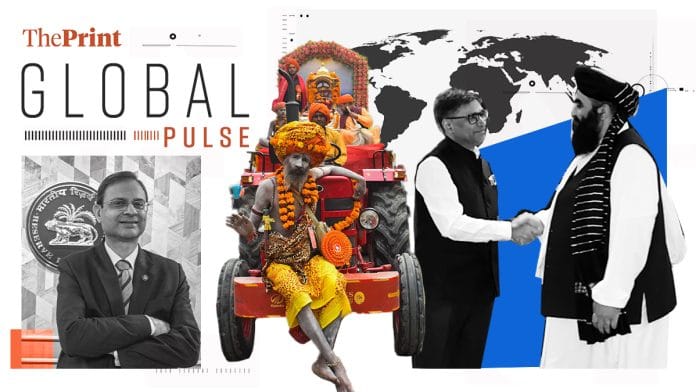New Delhi: There’s a new anti-incumbency trend, and it seems to be confined to just the developed world.
Incumbents are more popular than ever in countries part of the developing world, writes chair of Rockefeller International Ruchir Sharma in the Financial Times. But the opposite is true in countries like the US, Canada, UK, and France. India, Indonesia, and Mexico, on the other hand, have all seen incumbent parties win political victories.
“Hostility to the powers that be in Europe, Japan and the US has been tied in varying degrees to the recent spikes in immigration and prices for staple goods, which are feeding a sense that the system is increasingly rigged and biased against the average person. This is further fuelling a long-term decline of public trust in government,” writes Sharma.
Take the price of eggs for example: by 2024, they were 200 percent higher in the US compared to pre-pandemic levels, compared to only 50 percent higher in India. Such inflation in already unaffordable countries was stoking the anti-incumbent sentiment, according to Sharma.
“The mounting impact of inflation, immigration and inequality helps explain why only about 20 percent of Americans express trust in government, down from a peak above 70 percent in the 1960s. In developing nations, trust is ticking up on average, lifted in the past decade by huge gains in nations where incumbents won last year. Nearly 50 percent of Mexicans and over 70 percent of Indians and Indonesians now express trust in their government,” he writes.
While Modi lost out on legislative majority, he still won a third term—Sharma locates the “more efficient delivery of welfare benefits” as what worked in his favour.
“For now, much of the developing world sees no urgent reason to throw the bums out,” he writes.
The BBC offers insight into why India is reaching out to the Taliban now. After all, this diplomatic outreach comes a full three years after Kabul fell.
It was a major strategic blow to India. “Two decades of investment in Afghanistan’s democracy—through military training, scholarships and landmark projects like building its new parliament—were swiftly undone,” the BBC writes. “The collapse also paved the way for greater influence from regional rivals, particularly Pakistan and China, eroding India’s strategic foothold and raising new security concerns.”
Yet, last week, foreign secretary Vikram Misri met the Taliban foreign minister in Dubai, which a previous edition of Global Pulse covered. The meeting gave the Taliban leadership the de facto legitimacy it has been seeking from the international community, the BBC reports.
“No country has formally recognised the Taliban government, but up to 40 countries maintain some form of diplomatic or informal relations with it,” the report continues. And India has maintained contact with the Taliban over the last three years. Jaishankar even told Parliament in 2023 that India has “historical and civilisational ties” with Afghanistan.
“Clearly, India’s recent outreach helps advance its core interests in Taliban-led Afghanistan: preventing terrorism threats to India, deepening connectivity with Iran and Central Asia, maintaining public goodwill through aid, and countering a struggling Pakistan,” the BBC reports.
Bloomberg reports that India’s new RBI governor, Sanjay Malhotra, seems to be willing to allow the rupee to be more flexible.
“He’s showed keen interest in the RBI’s currency intervention functions and expressed no opposition when his team explained the recent movements in the rupee and the need to allow it to depreciate,” the report quotes sources as saying.
The RBI’s overall objective is still to avoid a specific level for the rupee, and to regularly intervene to prevent excessive volatility. But there might just be a “wider gap in the closing level of the currency from the previous day’s close if the situation warrants,” Bloomberg reports.
The rupee sharply slumped to 86.58 against the dollar earlier this week. “Since Das’s departure, the rupee has slumped 2 percent against the dollar with the one-month implied volatility jumping to its highest in more than a year. The currency tumbled by the most in nearly two years Monday to cross the symbolic 86 a dollar level, fueled by a strong US currency and rising oil prices after sweeping sanctions on Russian energy,” the report says.
The RBI is keeping a close watch, Bloomberg reports, and expects the rupee to strengthen somewhat once US President-elect Donald Trump is sworn in. Lots to look forward to with Malhotra’s first ever monetary policy meeting in February, then.
Meanwhile, the New York Times also jumps on the Mahakumbh train, calling it the “world’s largest gathering”. After all, more people than the entire population of America are expected to turn up.
“A major display of Hinduism, the event has recently become an important political event with the rise of Hindu nationalism, backed by Prime Minister Narendra Modi’s right-wing political party,” the NYT reports.
The sheer scale of it is “astonishing”, the story says. It’s the most expensive Mahakumbh mela till date, costing over $800 million—most of the expenditure has gone towards preventing stampedes and outbreaks of disease. But it’s also going to be the most lucrative mela, with the UP government expected to generate billions of dollars.
“The Mahakumbh Mela has always been an important symbol of Hinduism, though it was usually not politicised until the recent rise of the idea of India as a Hindu nation,” NYT reports. “This year’s festival is the first since Mr Modi’s Hindu nationalist political party, the BJP, became the country’s ruling party 11 years ago.”
Also read: India’s ties with Russia a ‘deal with the devil’ & IT sector pins hope on Modi-Trump bonhomie






